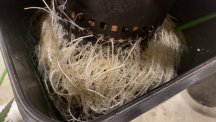spyralout
🌱🌿🌲🔥💨
Is there a significant difference between distilled and RO water for our application? I'm running RO in hydro and it's working quite well. Would distilled water be the same? I ask because I might have found a distilled water machine (not tabletop, it's a decent sized unit that almost looks like an ac unit) for a decent price. Just wondering if anybody has any experience with water distiller machines - pros/cons vs. RO.
Thanks
Thanks

